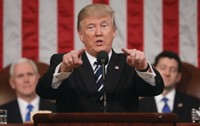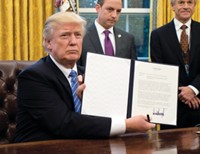Advertisement
Grab your lab coat. Let's get started
Welcome!
Welcome!
Create an account below to get 6 C&EN articles per month, receive newsletters and more - all free.
It seems this is your first time logging in online. Please enter the following information to continue.
As an ACS member you automatically get access to this site. All we need is few more details to create your reading experience.
Not you? Sign in with a different account.
Not you? Sign in with a different account.
ERROR 1
ERROR 1
ERROR 2
ERROR 2
ERROR 2
ERROR 2
ERROR 2
Password and Confirm password must match.
If you have an ACS member number, please enter it here so we can link this account to your membership. (optional)
ERROR 2
ACS values your privacy. By submitting your information, you are gaining access to C&EN and subscribing to our weekly newsletter. We use the information you provide to make your reading experience better, and we will never sell your data to third party members.
Environment
Obama Lays Out His Plans
State Of The Union: President proposes small steps, unilateral action that will impact the chemical enterprise
by Jeff Johnson , Glenn Hess , Andrea Widener
January 30, 2014
| A version of this story appeared in
Volume 92, Issue 5

In his Jan. 28 State of the Union address, President Barack Obama offered a series of small steps that, if taken, could result in significant consequences for the chemical enterprise. These include spurring the growth of new technologies and increasing R&D spending.
Overall, compared with previous years’ agendas, this one is scaled back. But it included a promise to use presidential authorities to bypass the congressional infighting and gridlock that have dogged his tenure in office.
While he is “eager” to work with Congress, Obama said, “America does not stand still—and neither will I,” referring to his willingness to use executive orders to achieve change.
The President continued his push from the past few years for new manufacturing innovation institutes. Last year, he sought the creation of some 15 institutes that bring together industry, academia, and local governments to work on fundamental manufacturing research. But Congress didn’t go along.
Obama moved ahead anyway, using existing Departments of Defense and Energy funding. Two centers are up and running. One in Youngstown, Ohio, focuses on three-dimensional printing. Another in Raleigh, N.C., is working on power electronics. This year, Obama wants to launch six more centers.
The President also exhorted Congress to restore basic research funding that was cut out of last year’s appropriation. Obama said research funding enhances U.S. innovation and will help to “unleash the next great American discovery.”
In a nod to jobs and economic expansion, Obama urged Congress to give his Administration broader authority to hammer out trade deals. He called on lawmakers to act quickly as the U.S. negotiates with the European Union and Pacific Rim nations on two new free-trade agreements.
“We need to work together on tools like bipartisan trade promotion authority to protect our workers, protect our environment, and open new markets to new goods stamped ‘Made in the USA,’ ” Obama said. “China and Europe aren’t standing on the sidelines. Neither should we.”
That view is popular with the chemical industry, particularly the Society of Chemical Manufacturers & Affiliates. Access to foreign markets, SOCMA notes, is critical for chemical industry growth. On the other hand, SOCMA and other industry groups oppose use of unilateral presidential action.
Obama also touched on patent reform, another key area for chemical companies. He urged Congress to pass patent reform legislation that would allow U.S. businesses to avoid costly litigation.
In addition, the President promised to cut red tape to encourage construction of new chemical plants to take advantage of the recent flood of U.S. natural gas.
The natural gas bonanza has reduced U.S. carbon dioxide emissions, Obama noted. Still, he said, “we have to act with more urgency—because a changing climate is already harming western communities struggling with drought and coastal cities dealing with floods.”
“Climate change is a fact,” the President firmly stated. “And when our children’s children look us in the eye and ask if we did all we could to leave them a safer, more stable world, with new sources of energy, I want us to be able to say, ‘Yes, we did.’ ”
The theme of Obama’s hour-plus speech was the plight of ordinary Americans and the inequities in pay and future opportunities they face, which is slowly drawing greater national attention.
“Our job,” Obama stressed, “is to reverse these trends. What I offer tonight is a set of concrete, practical proposals to speed up growth, strengthen the middle class, and build new ladders of opportunity.”




Join the conversation
Contact the reporter
Submit a Letter to the Editor for publication
Engage with us on Twitter